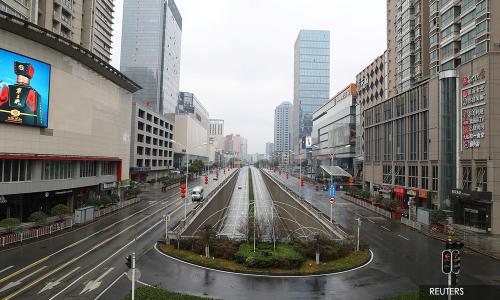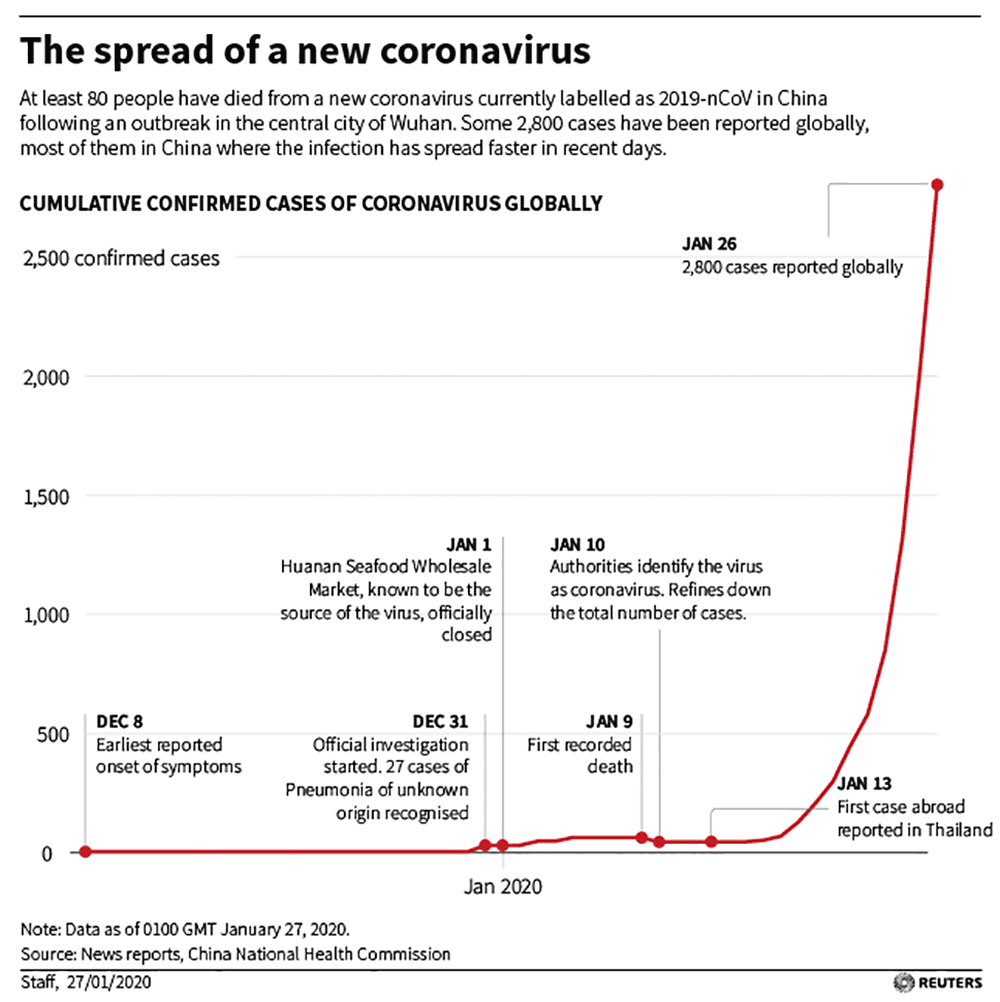Chinese premier visits virus epicentre as death toll hits 80
CORONAVIRUS | Chinese Premier Li Keqiang today visited Wuhan, the epicentre of an outbreak of a new coronavirus that has killed 80 and infected more than 2,700 people, as Beijing sought to signal how seriously it aims to respond to the developing crisis.
The number of deaths from the flu-like virus in Hubei province, including Wuhan city, climbed from 56 to 76 overnight, health commission officials said, with four deaths elsewhere in China. While a small number of cases have been confirmed in more than 10 countries, no fatalities have been reported elsewhere.
The total number of confirmed cases in China rose about 30 percent to 2,744, about half of which were in Hubei.
Li, the most senior leader to visit Wuhan since the outbreak began, went to the city to inspect the ongoing efforts to contain the epidemic and spoke with patients and medical staff, China's government said in a statement.
China's cabinet said yesterday that it would extend the week-long Lunar New Year holiday by three days to Feb 2 in a bid to slow the spread of the virus. The Lunar New Year is usually a time for millions of Chinese to travel, but many have had to cancel their holiday plans due to virus-related travel restrictions.
Wuhan is already under virtual lockdown and severe limits on movement are in place in several other Chinese cities.
The central city of 11 million people clamped down further today, announcing the immediate suspension of visa and passport services for Chinese citizens until Jan 30. Despite the restrictions, the mayor of Wuhan said yesterday that five million people had left the city for holidays and other reasons.
Images from Wuhan showing hospital corridors packed with people seeking treatment have circulated on Chinese social media, along with complaints of soaring prices for essentials such as vegetables.
Incubation period 1-14 days
Chinese leaders have called for transparency in managing the crisis, after public trust was eroded by the cover-up of the spread of Severe Acute Respiratory Syndrome (SARS), a coronavirus that originated in China and killed nearly 800 people globally in 2002 and 2003.
The newly identified coronavirus has created alarm because much about it remains unknown, such as how dangerous it is and how easily it spreads. It can cause pneumonia, which has been deadly in some cases.
Chinese National Health Commission Minister Ma Xiaowei said on Sunday the incubation period could range from one to 14 days, and that the virus was infectious during incubation, which was not the case with SARS.
The virus is believed to have originated late last year in a seafood market in Wuhan that was illegally selling wildlife. It has spread beyond Wuhan to Chinese cities Beijing and Shanghai, as well as more than 10 countries including France, Japan and the United States.
Airports around the world have stepped up screening of passengers from China, although some health experts have questioned the effectiveness of these efforts.
The World Health Organisation (WHO) last week stopped short of calling the outbreak a global health emergency, but some health experts question whether China can contain the epidemic.
WHO Director-General Tedros Adhanom Ghebreyesus said last Saturday he was travelling to Beijing to meet officials and health experts dealing with the coronavirus.
Wuhan evacuation plans
Chinese-ruled Hong Kong has eight confirmed cases and said it would ban entry from today to people who had visited Hubei in the past 14 days. The ban will not apply to Hong Kong residents.
France, Italy, Japan, Australia and the United States have all said they are working to evacuate citizens from Wuhan.
Japan is expected to arrange a charter flight as early as tomorrow for any of its citizens who wish to return from Wuhan, Kyodo news agency reported. Meanwhile, France said it expected to repatriate up to a few hundred of its 800 citizens living in the Wuhan area.
Hubei Governor Wang Xiaodong said at a news conference yesterday he felt "agonised" and responsible for the outbreak, although his comments sparked anger on Weibo, China's equivalent to Twitter.
"He thinks one sentence of apology will be enough to solve the problem? Let's await the judgment of the people of the country," one user posted.
It is rare for Chinese authorities to allow such criticism of public officials on the country's tightly controlled social media.
The outbreak continued to upset global markets on today, with stocks tumbling, demand spiking for safe-haven assets and Singapore warning of negative impacts on its economy, business and consumer confidence.
Some of China's biggest companies have been affected by the outbreak, with hotpot restaurant chain Haidilao International Holding shutting stores across China from Jan 26 to Jan 31.
Gaming giant Tencent Holdings Ltd advised staff to work from home until Feb 7, and e-commerce firm Alibaba removed sales of overpriced face masks from its online Taobao marketplace as prices surged.
- Reuters
RM12.50 / month
- Unlimited access to award-winning journalism
- Comment and share your opinions on all our articles
- Gift interesting stories to your friends
- Tax deductable


